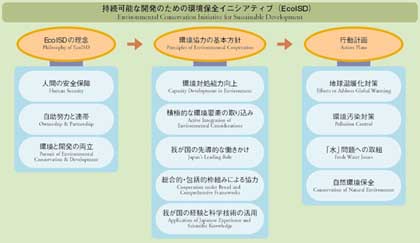
|
Environmental Conservation Initiative for Sustainable Development (EcoISD) Japan will continue actively to extend environmental cooperation, mainly through its ODA, in order to support sustainable development in the world. In 2002, for this purpose, Japan issued its Environmental Conservation Initiative for Sustainable Development (EcoISD), replacing the ISD (1997), so as to carry out more effective and efficient environmental cooperation. Based on the principle of Capacity Development in Environment and Application of Japanese Experience and Scientific Knowledge, etc., Japan will promote action plans in four areas of priority: Efforts to Address Global Warming, Pollution Control, Fresh Water Issues and Conservation of Natural Environment.
Kyoto Initiative At the 3rd session of the Conference of the Parties to the UN Framework Convention on Climate Change held in Kyoto in 1997, Japan, the Japanese government announced the Kyoto Initiative and declared its intention to provide active support to global warming abatement projects of developing countries. The Direction of International Environmental Cooperation [PDF] In November 2004, the Minister of the Environment requested the Central Environment Council to consider the shape of future international environmental cooperation corresponding to changes in and outside the country concerning environmental conservation in recent
years. The Council established an International Environmental Cooperation Technical Committee under the Council’s Global Environment Committee. |
